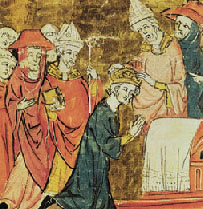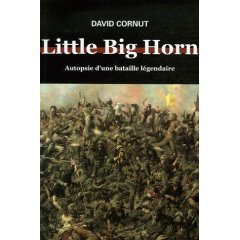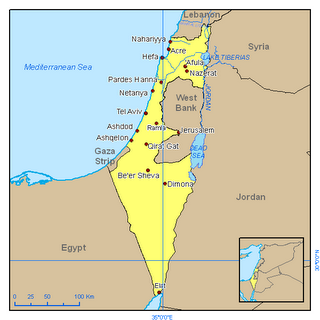
It was an era when Europe was trying to be just, remembering the glorious days of the Roman Empire. She first offered this overwhelming responsibility to Charlemagne and Otto. Chronic small portion of an empire to another.
Christmas 800. Rome. Charlemagne Capital in recent weeks. At 57, he is still in the prime of life.
Some time ago, Pope Leo III was cleared of any suspicion that weighed against him, suspicion of immorality among others. It is true that the support of his powerful friend, the king of the Franks and Lombards, Carolus Magnus, was not useless!
Charles attends mass. At the end of the ceremony, an event happens that we have seen since 476: Pope raises the crown on the head of the king and the emperor is pronouncing the following sentence: "A very pious Charles Augustus, by God crowned great and pacific emperor life and victory
Sources differ on the reaction of Charlemagne. According to Einhard (Vita Carolis), it is furious because he understands that the pope is also taking the initiative to appear in superior temporal. It is the papacy which the Emperor and not vice versa.
If you believe the biographers of the Vatican, the new ruler is absolutely delighted.
According to some historians, Charlemagne and Leo III had prepared the whole ceremony. Leo III was gaining legitimacy facing the Curia who challenged again. Charles got his support of the papacy, posing as a champion of Christianity.
matter: the Empire reborn. Empire, he was already in the territory without equal that of ancient Rome. Gaul, Germany, northern Italy, northern Spain, Slavic territories, Friesland (Holland), Belgium, Luxembourg, Austria .... Millions of people live under the rule of Charlemagne. The latter succeeded his father, Pepin the Short in 768, co-manager of the Frankish kingdom with his brother Carloman. Then as 771, he reigns alone, Carloman had disappeared.
It is the ideology that Christianity is needed throughout the territory, sometimes forcefully. In 782, Charlemagne had 4500 Saxons to run the example. A few years ago, he shot down their sacred tree. Paganism declined gradually and through Missi Dominici, Charlemagne's authority applies to everyone.
From 802, Charles is represented wearing a laurel wreath and adopted the following titular King of the Franks and Lombards, Emperor. But he conscious of being the heir of Augustus? Not so sure that some historians put forward his proposed division of territory between his three son. A marriage with a Byzantine princess fails. It would have brought together the Eastern Roman Empire with that of Charlemagne. A missed opportunity.
Charles died in 814. His son Louis the Pious was the heavy burden to succeed him. Charles has himself crowned in 813, passing the pope. Indeed, the old king refuses to accept the idea that to be the pope who should be the Emperor.
In 817, Louis takes an unprecedented decision: flouting the law Frankish Empire will not be divided and only his eldest Lothair succeed him as Emperor. His brothers, Pepin and Louis the German will have the title of king and will be subject to Lothair. You should know that if Louis the Pious became the sole Emperor, because he is the only living heir.
But the birth of Charles the Bald in 823 will ruin the Ordinatio Imperri (the name of the law 817). Jealous, the son going to rebel, to file their father, restore the throne: a long litany of conflicts (which I shall discuss in a future article). In 840, Louis died, but the war continues. In 843, the sharing of Verdun causes the end of the Carolingian Empire. First
parenthesis.
project a century later. Exactly in 955. Certainly, the unity of the empire was restored twice, but in very short-lived: in 877 by Charles the Bald in 887 by Charles the Fat. But each time, it was the result of chance, estates happy.
In 955, Otto crushed the Hungarians Lechfeld. Already master of Italy since 951, the German sovereign obtains considerable prestige comparable to that of Charles Martel in 732. For several decades, Hungarians ravaged Europe, is succeeded by the Normans. Burgundy and Berry had been plundered in 937.
In 962 he was crowned Emperor by John XII. And his first acts will be inspired by the great Charlemagne, which he repeats the titular.
Fifteen months later, he filed the pope in order to consolidate his authority over Rome (Louis the Pious had done the same in 824), Italians to back the feudal obedience and forced the Byzantine Empire to recognize it.
Otto III in 999 establish his court in Rome. Now we talk about the Roman Empire St. Compared to that of Charlemagne, the territory is smaller because it does not contain the western part, which since 987, is directed by the Capetian. But its prestige is enormous because it is the inheritor of the Roman Empire.
It lasted until 1800, when Napoleon destroy its own benefit.
But that's another story.

